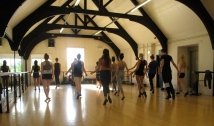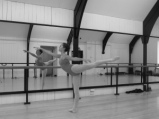In 1986, Rubicon’s Full Time Preliminary Dance Training Course was launched in response to demand from dancers who wanted to eplore the art form more fully. The course grew, as did the demand, and has now become a fully accredited two year course, providing for many a bedrock for vocational training and dance related careers.

We place importance on health and well-being, in maximising expectation, opportunity and achievement, inspiring individuals to reach their full potential.
This is the only course of its kind in Wales. It is a stepping stone for students of different ages, abilities and experiences to develop their skills and technique. It’s a challenge, where training is about nurture; developing good quality and integrity in dance practice. It’s an opportunity to discover your talent.
You will see how dance transforms and engages people by participating in sessions and supporting our youth provision, education and school work, people with disabilities, adult over 50’s groups in community centres in Cardiff and Newport. But most importantly, it’s an opportunity to learn how to support each other, in an environment where you can reach your full, creative potential.

The course works to instil respect for learners themselves, their fellow colleagues and staff and to support and embrace the working ethos of this professional community hub. Learners accepted onto the course become part of the day to day life of Rubicon, both within the centre and as part of the development (outreach) programme, in addition to their own specifically tailored development plan. This course is uniquely devised with strong focus on practical provision that encourages and enhances physical awareness, technical ability and creative skills. Rubicon provides additional support and resources by enabling free and open access for all learners to attend classes on a weekly basis, as part of the centre programme and in a range of diverse styles.
There is the opportunity to gain further experience by contributing to Rubicon’s educational and community work and to support the development programme. You can also become involved in the volunteer scheme, which is essential to supporting the development of a charitable organisation working in the heart of the community.
Many students go on to full-time vocational training, foundation or full dance degree or HND courses. These students then progress to becoming performers, teachers or community dance practitioners; and often a combination of all these practices. However, some use the course simply to enhance their skills and increase their enjoyment and experience of dance. At Rubicon we support all chosen career paths equally and will help you find the best route forward for you as an individual. Some learners accessing the Rubicon course are mature students who are specialised in other vocational disciplines or careers such as photography, fashion, drama, medicine and engineering and utilise this one year course to enhance their experience, or to diversify within their chosen fields of expertise. Examples of successful progression routes after Rubicon training include: The Place, Rambert, Laban, Northern School of Contemporary Dance, Cardiff Met Dance Degree, Bristol Foundation Degree, Bath, Roehampton, Middlesex, Coventry Universities, London Studio Centre, Urdang and The Centre.
Who can apply?
The minimum age is 16 years. Applications are welcome from students of any age. Previous dance experience is essential, as is motivation, energy and commitment.
Selection process
Applicants are invited to Rubicon for initial assessments in contemporary dance, ballet and creative dance. These sessions are purely to assess potential and require no specific set level of achievement. You are not expected to prepare individual set work, however this is an opportunity for you to use this process to work out if Rubicon is the right place for you.
This is followed by an informal interview, which gives applicants the opportunity to find out more about the course in relation to their specific development needs, and for staff to assess whether the applicant is suitable. Funding possibilities will also be discussed. In the event of uncertainty, you may be invited to access the centre programme activities during the summer term to determine suitability and commitment. You will be assessed during this period and then invited to return for a final recall audition, usually held in July. This ensures that all candidates are given sufficient opportunity in the selection process.
Course Provision
Course provision and accreditation- BTEC is through the Workers’ Educational Association, South Wales (WEA).
Audition Dates for 2015-16
Saturday May 9th 2015
Saturday May 16th 2015
Saturday June 6th 2015
All candidates must complete an application form. Please contact paul@rubicondance.co.uk for an application form, or call 02920 491477.
